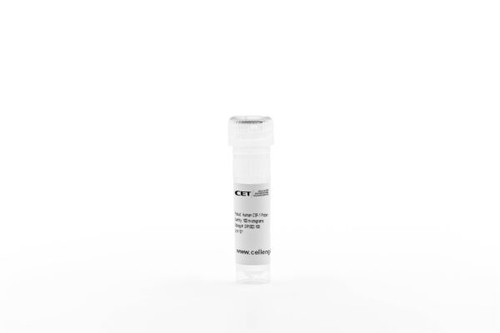Description
Product Description
Human Recombinant Colony-Stimulating Factor 1 Protein (CSF1/M-CSF1)
Human Colony Stimulating Factor 1 (CSF1), also known as Macrophage Colony-Stimulating Factor (M-CSF), is a secreted cytokine that plays a crucial role in the differentiation of hematopoietic stem cells into macrophages and other related cell types. This growth factor is vital for the proliferation, differentiation, and survival of hematopoietic precursor cells, particularly mononuclear phagocytes like macrophages and monocytes [i]. By promoting the growth and activity of these key immune cells, CSF1 is essential for immune responses, tissue homeostasis, and inflammation regulation [ii].
CSF1 stimulates various cellular functions in macrophages and monocytes, such as enhanced phagocytic and chemotactic activity, which contribute to immune defense and tissue repair. This factor interacts with the CSF1 receptor (CSF1R) or M-CSF-R on the cell surface, leading to the activation of signaling pathways that regulate cell proliferation and survival. The binding of CSF1 to its receptor triggers the dimerization of CSF1R, followed by autophosphorylation of tyrosine residues. This cascade of tyrosine phosphorylation activates multiple downstream signaling events that drive macrophage differentiation and function.
The active form of CSF1 exists extracellularly as a disulfide-linked homodimer, produced through proteolytic cleavage of membrane-bound precursors. This form of CSF1 is often used in research as an Fc-fusion protein tag from human IgG1 to enhance stability and improve therapeutic potential.
Product Specifications:
- Form: Lyophilized powder
- Available Sizes:
- 10µg (SKU: CET-GR1002-10) Human Colony Stimulating Factor 1 (CSF1)
- 50µg (SKU: CET-GR1002-50) Human Colony Stimulating Factor 1 (CSF1)
- 100µg (SKU: CET-GR1002-100) Human Colony Stimulating Factor 1 (CSF1)
- Storage: Store at -20°C, avoid repeated freeze-thaw cycles
Research Applications:
- Hematopoietic stem cell differentiation
- Macrophage differentiation and activation
- Immunology and inflammation research
- Cancer immunotherapy studies
- Tissue repair and wound healing
Shipping & Storage:
- Shipping: Shipped with ice packs to maintain stability during transport
- Storage Recommendation: Store lyophilized powder at -20°C for long-term storage
CSF1 is an essential tool in research focused on macrophage biology, immune responses, and hematopoiesis. Its applications in disease modeling, immunotherapy, and regenerative medicine make it a valuable resource for exploring immune regulation, cancer immunotherapy, and tissue repair.
Product Specifications
Documents & Links
| Documents & Links for Human Recombinant Colony-Stimulating Factor 1 (CSF1) Protein | |
| Datasheet | Human Recombinant Colony-Stimulating Factor 1 (CSF1) Protein Datasheet |
| Vendor Page | Human Recombinant Colony-Stimulating Factor 1 (CSF1) Protein at Cellular Engineering Technologies |
| Documents & Links for Human Recombinant Colony-Stimulating Factor 1 (CSF1) Protein | |
| Datasheet | Human Recombinant Colony-Stimulating Factor 1 (CSF1) Protein Datasheet |
| Vendor Page | Human Recombinant Colony-Stimulating Factor 1 (CSF1) Protein |



